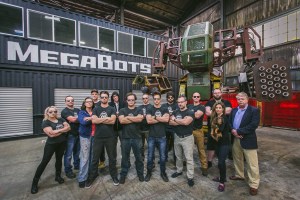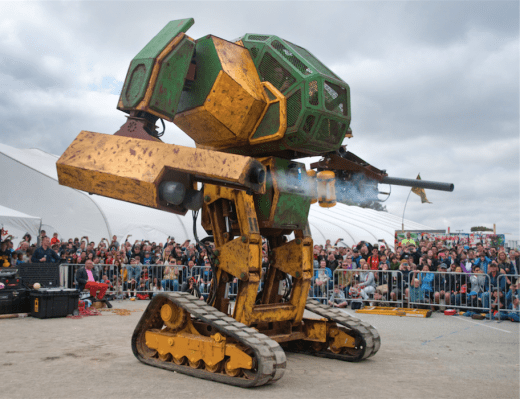Oakland, Calif. startup MegaBots Inc. has raised $2.4 million in seed funding to bring the robot-fighting stuff of manga and anime to a venue near you.
According to MegaBots cofounders, Gui Cavalcanti, Matt Oehrlein, and Brinkley Warren, the startup aspires to follow in the footsteps of major sports associations like Formula 1 or UFC.
With the seed funding, Warren said, MegaBots will be partnering with a law firm called Latham Watkins to help set up and roll out its league internationally, taking an approach similar to the Olympics.
Specifically, MegaBots will be working with Latham Watkins Partner Christopher D. Brearton, who represents the International Olympic Committee, and has helped organized leagues and governing bodies in sports including the NBA, MLB, NFL and others.
It’s hard to imagine that anyone in the world finds giant, gas-powered robots boring. But last year, to hype the future sport, MegaBots challenged Japan-based Suidobashi Heavy Industries to a duel.
The Japanese company, which existed before MegaBots was founded in 2014, accepted the younger startup’s challenge, and are reportedly working on a special edition of their Kuratas robot for the duel.
Kuratas weighs more than 9,000 pounds. MegaBots’ MkII clocks in at 12,000 pounds. The battle-ready robot will weigh closer to 15,000 pounds, Warren said. Early versions of the MkII can also hurl 3-pound paintballs at other robots, potentially blinding their computer vision systems.

MegaBots employees at company headquarters in Oakland, Calif.
Team USA and Team Japan will face off at a date and venue that MegaBots has yet to determine. At Suidobashi’s insistence, MegaBots will organize the duel.
MegaBots is evaluating potential host countries and working with governments that may be interested in and willing to host such an event, and future tournaments.
A sport like this will inevitably involve complex international logistics planning, Warren says, as one can’t simply ship a 15,000 pound robot across international borders.
Previously, MegaBots raised $550,000 in a crowdfunding campaign, and have also sold merchandise and sponsorships to sustain their business so far. The company has generated over $1 million in revenue from live appearances and merchandise sales.
Investors in the company’s seed round have so far included Azure Capital Partners, AME Cloud Ventures, Autodesk, Maveron, and angel investor Ray Rothrock, former chairman of the National Venture Capital Association.
Azure Capital Partners General Partner Michael Kwatinetz said he backed MegaBots, in part, because “There is a giant opportunity for live events that stimulate people’s interest. That much is obvious from examples like the WWE or Nascar.”
He also pointed out that, with a few notable exceptions, most companies don’t have the engineering talent to develop robots like this.
Typically, robotics engineers train to build battery powered robots, not hydraulic ones. And electrical robots don’t have the capacity to carry people, or move around exoskeletons that weigh hundreds of pounds.
The investor expects MegaBots to use the seed funding to build their robot for the fight against the Japanese team they’ve challenged; and to secure sponsorships, perhaps even a TV contract for a program that tracks the team from building the robots to competing against Suidobashi, something like the MMA’s Ultimate Warrior.
